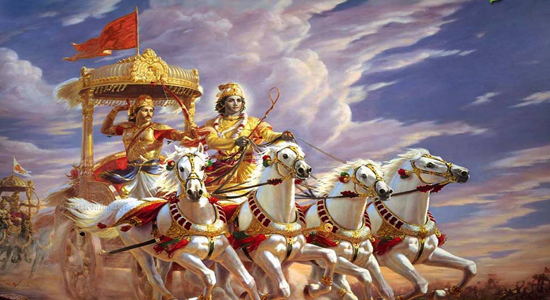Psychological Confusion Of Arjuna
| Date :13-Apr-2025 |

Psychological Confusion Of Arjuna
The first chapter of the Geeta
deals with the grief of
Arjuna. Consequent upon
that, Lord Krishna counsels him to
follow the righteous path. During
his course of counseling, Lord
Krishna imparts the knowledge of
harmonious and balanced personality and how the intellect of a
person is anchored into equipoise
and equanimity. A person whose
wisdom is steady has been called
Sthitaprajna in the Geeta. This
discourse of Lord Krishna has
been called Buddhi Yoga or the
Yoga of knowledge.
Further, Lord Krishna suggests
Arjuna to follow his bounden path
of his duty and fight the battle.
The duty is to be performed without being attached to it.
Attachment generates worries and
anxieties. Hence the mind is to be
focused on the present so that a
flow state is created without any
distractions of either past or future.
This is called Karma Yoga or the
Yoga of action.
The two fold
description of Yoga of knowledge
and Yoga of action creates a confusion in the mind of Arjuna and
he is still not clear which path to
follow. Since he is still not free
from the lurking tendency of
escapism, so he poses a query to
Lord Krishna as to why he exhorts
him to engage in the action
whereas the path of knowledge is
superior as told by him.
Based upon this question of
Arjuna, the third chapter has been
named Karma Yoga or the Yoga of
action. Lord Krishna clarifies that
both the paths of knowledge and
action are complementary to one
another. An integrated human personality emerges out of a perfect
combination of knowledge and
action. Self evolution takes place
with actions performed with a
pious motive, a sense of surrender
and a spirit of service. Such
actions do not create bondage.
Actions are the foundation upon
which the edifice of knowledge is
built. Nobody can remain without
actions even for a moment. Even if
one is sitting idle, the mind is on
move and the body is active internally performing innumerable biological activities. Hence actions
are to be performed with a pure
bend of the mind. Lord Krishna
propounds that he has nothing to
gain, still he performs actions.
Common persons follow the leaders, so inaction on the part of
leaders will send a wrong message in the society.
So sitting idle
and entertaining the sensual
thoughts is a sign of hypocrisy.
Thoughts and actions should be
aligned with one another. In this
context Lord Krishna elaborates
very extensively on the importance of the control over sense
organs by the mind. This mental
control comes through right living
and self discipline. Actions performed with a sense of detachment with the mental control over
sense organs in the service of
humanity becomes a Yajna or a
sacrifice.
The whole creation is sustained
through sacrifice. Nature sacrifices
itself for all species and demands
nothing. Similarly humans need to
perform Yajna or sacrificial acts to
nourish the powers of nature. Lord
Krishna has used a very important
word Lokasamgraha in the context. It connotes the collective
welfare of all. The maintenance of
collective welfare will sustain the
universe. Such a temperament is
generated by controlling the constant agitations of the mind, the
fleeting sensual enjoyment and
impulsive craving and emotional
outbursts like anger. This chapter
contains the beautiful tools and
techniques of self control and evolution with knowledge-oriented
action.
(The writer is Former DG
Police & CG, Homeguards,
Maharashtra) ■

By DR BHUSHAN KUMAR UPADHYAYA